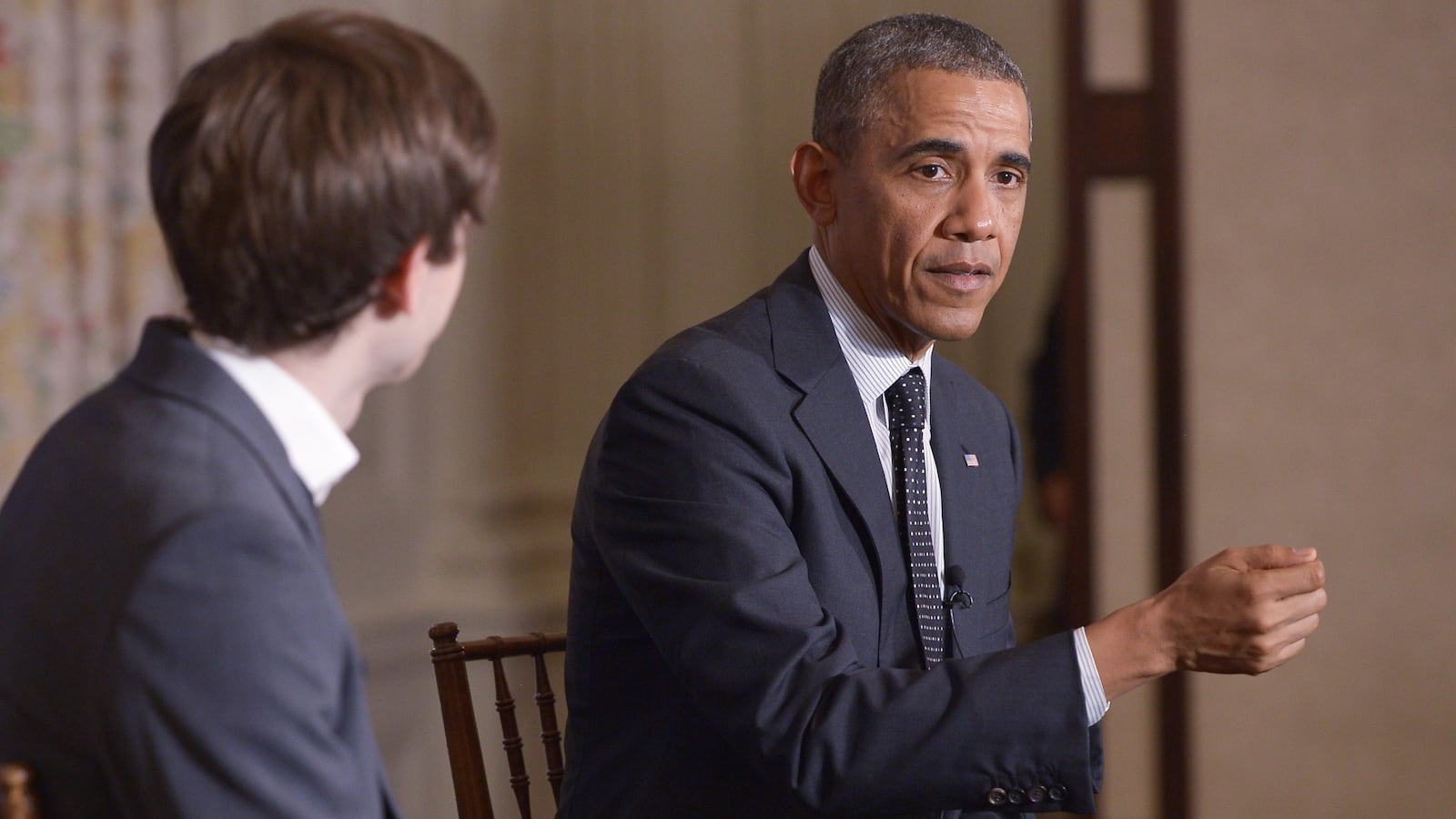Before you begin typing that comment about how this is just more millennial whining, let’s get some things out of the way: Yes, lots of young people—maybe even most—take out student loans without really understanding the ramifications of beginning their lives with tens of thousands of dollars worth of debt.
Yes, some people go to college to pursue a passion without necessarily realizing that the world doesn’t need as many undergraduate-level art history majors as there are people who want to study art history. Yes, in principle, people should pay back their debts. That said, the mechanisms we have to pay for higher education are seriously broken.
A few days ago, Tumblr reached out to me: They were having a Q&A with the president about student loans. Could I, along with a few other Tumblr users, help cull through the questions and select some? Could I join them in D.C.?
The Q&A between President Obama and Tumblr CEO David Karp came on the heels of Monday’s announcement that starting in December 2015, 5 million Americans with student debt could join the “Pay As You Earn” plan that caps student loan repayment at 10 percent of the borrower’s income and forgives the remainder after 20 years. Obama also mentioned the College Scorecard (which, unfortunately, as of this writing, is not working).
These are all great steps. But none of them is going to solve a problem that becomes painfully clear when you read 2,500 questions from anguished young Americans.
The event, live-GIF’ed, was attended by an audience of Tumblr heavyweights, science and policy bloggers, and students. Everyone dressed appropriately and even impeccably—not a flip-flop in sight. But underneath the business-appropriate attire ran a current of resignation; crushing student debt is the rule, not the exception, in this peer group. I sat next to a young Treasury Department worker who confided that not only is he up to his neck in debt, but so are his bosses.
Everyone was understandably excited about being in the White House; as a Marine played a gilded grand piano under an oil painting of Bill Clinton, attendees quietly snuck a souvenir napkin into their purse or wallet.
The questions themselves, however, were tough. Though only about 15 made it to Obama, thousands were submitted by Tumblr’s user base, which skews young and liberal. There were the silly—question after question about what Obama’s favorite anime is, which Pokemon he favors or (actually, this felt like a fair question) what his favorite parade ever is
But most of them were the same. The first few I read made my shoulders slump, but by the 400th, I’d hardened up. They began to feel less like sad aberrations and more like an accurate read on what it means to be a young person in this country who has absolutely no idea whether she should even go to college—the high-schoolers wonder if it's worth it; those who have finished ask if it was a mistake.They all began to sound the same: I was told that after high school, if you want to be successful, you go to college. I did. I took out $22,000, or $68,000, or $120,000, worth of student loans. Now, I’m out of college, I can’t find a job, and even declaring bankruptcy won’t free me from this.One began this way: “I'm currently worth more dead (with my life insurance policy) than alive (with my student loan debt).” Another writer said she became disabled during her college years, and went on SSDI. Her loan, worth $57,000, is now in default, and she is curious whether her disability payments will be cut as a result. One said simply, “Why do I have to make a life-changing decision of what job I’ll have for the rest of my life when only a week prior I had to ask to use the bathroom?”High school is a crucible, and for many high-schoolers, a four-year sprint to distinguish yourself academically and athletically, and to pad that resume. With all the talk of how colleges are more selective than ever (and the rarely-spoken but often implied threat that if you do not go to one of 10 schools, you will be an irredeemable failure), it’s understandable that students would come out of high school with the impression that any amount of debt is worth their shot at being a successful adult.College should be more affordable. Student loan debt should carry low interest rates, and hopefully Elizabeth Warren’s bill will move through the Senate, thus allowing those with student debt to refinance their loans (one great question: Why is there a lower interest rate to buy a truck than a college education?) But those are high hurdles, and there’s something that can and should be done in the meantime.If a 16-year-old wants her drivers’ license, she has to take classes, learn the ins and outs of her state’s traffic laws, and pass a test. She’ll spend hours and hours learning, practicing, and understanding how to be a responsible driver. If she wants to take out a loan that’s worth up to $100,000, she’ll spend about an hour filling out a FAFSA. It’s no surprise that in that situation, she may not be the most responsible borrower—yes, some 18-year-olds are remarkably financially literate. But most are not.There is absolutely no reason that high-schoolers shouldn’t be as well-versed in financial literacy as they are in literature, science, or math. Frankly, many of us won’t, in our day-to-day lives, use calculus, but every single one of us must understand how money works.Before high-schoolers take out loans for college, they must understand what their repayment looks like, how much more they will pay once interest is factored, what the average employment rate for various college majors are and, most importantly, that four-year college is not a requirement for a happy or successful life.“We do have to do a better job of giving young people who are interested an effective vocational education,” Obama said Monday, before mentioning that many skilled trades pay “$25, $30 an hour with benefits.”“I don’t want somebody to find out about that when they’re 30, after they’ve already taken a bunch of classes that they ended up not using, now they’ve got a bunch of debt. I’d rather them ... figure out that interest early so they can go straight into something that helps them get that job.”






